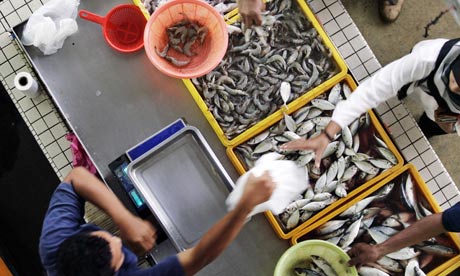
Homo erectus ape-men were avid tool users. We know this because they left crafted stone axes all over the globe. But they were no innovators. Once they started making axes, they stuck to the same design for more than a million years. If you've seen one hand axe, you've seen them all. It never seemed to occur to our erectus ancestors that you could make a better hand axe.
Then we modern humans arrived, and within 100,000 years or so not only devised fish hooks and farming, but steam engines, cellophane and one-click buying. What makes us so different? Why have we come so far so quickly when our hominid predecessors were stuck in a rut for thousands of generations? Matt Ridley has a simple answer. Trade. As he sees it, we owe the forward march of humankind to the benefits of barter. Homo erectus had a large brain and probably a rudimentary language. But they never saw the point of making things they could swap. Once we cottoned on to this trick, there was no stopping us. I am dexterous but weedy. You are strong but clumsy. I make the hooks and you catch the fish – and together we achieve something that neither of us could manage on our own.
Ridley makes a strong case for this thesis. He takes us from the hunter-gatherers who first ventured out of Africa up to the modern moguls of Silicon Valley, and shows how humanity has built innovation on innovation in its never-ending search for new gizmos that people will want to buy. From this perspective, specialisation is the essence of humanity, and self-sufficiency a misguided myth. If you really had to make everything yourself, you would be back in the stone age, scrabbling around with hand axes. Far better to work at one thing and let the market supply the rest.
Of course the path of economic progress does not always run smooth. Sudden advances are often followed by long periods of stagnation. But Ridley has an answer here, too. Just as trade fosters prosperity, so excessive government stifles it. Great civilisations are built when merchants find new markets, and decline when unproductive bureaucrats strangle their enterprise. In Ridley's view, things work better when individual economic actors construct solutions from the bottom up. Attempts to control markets from the top down tend only to make things worse.
This blanket suspicion of government is less convincing than Ridley's enthusiasm for trade. The book's strength, however, does not lie in its economic analysis. Ridley's real target is those doomsayers who insist that everything is going from bad to worse and something must be done about it. He shows that such gloom-mongers have always been with us, and have always been proved wrong. The last century was particularly pessimistic. A plethora of cultural and environmental sages predicted increasing poverty, pollution and pestilence. Yet here we are with worldwide life expectancy up by more than a third in the past 50 years, cleaner air and rivers than we have enjoyed for centuries, and birth rates falling dramatically everywhere. And all this allied with an economic growth rate that means that most of those who had "never had it so good" in the 1950s would now count as below the poverty line.
Much recent research suggests that increased wealth does not mean increased happiness. But Ridley points out that, even so, there is a correlation. On average, richer people are a bit happier (except, curiously, in the US). In any case, the research testifies more to the resilience of the human spirit than the unimportance of money. Cheerful people have a remarkable ability to remain cheerful, even in the face of adversity, while others are miserable souls who will be unhappy whatever happens. The corollary is that happiness is not the only index of wellbeing. No doubt most people in this country managed to be happy enough even when they were farm hands on a 70-hour week with only Christmas Day off and in constant fear of their children being struck down by disease. But don't tell me that we are therefore no better off now we work flexible hours on computer-related tasks and take three foreign holidays a year.
Ridley is no mindless Pollyanna. He knows that this is by no means the best of all possible worlds. Many millions still live in abject poverty, especially in Africa. The economic slump has destroyed jobs. The environment is over-exploited. Even so, Ridley is worried that excessive pessimism about these ills will lead to cures that are worse than the disease. On past form, things will get better if left to themselves. Fears about global warming are a particular bugbear of Ridley's. He does not dispute the figures about likely temperature increases. But he does object to the measures proposed in response. Restrictions on carbon-based power will badly damage the poor of today in order to protect our far richer descendants from intangible dangers that they will be better able to cope with themselves.
Ridley's arguments are unlikely to convince everyone. Some people will continue to insist that everything is going to the dogs whatever evidence they are shown. But this book does present a challenge to those pessimists who are prepared to be rational.
David Papineau is professor of philosophy at King's College London.

